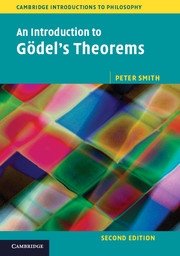Book contents
- Frontmatter
- Contents
- Preface
- Thanks
- 1 What Gödel's Theorems say
- 2 Functions and enumerations
- 3 Effective computability
- 4 Effectively axiomatized theories
- 5 Capturing numerical properties
- 6 The truths of arithmetic
- 7 Sufficiently strong arithmetics
- 8 Interlude: Taking stock
- 9 Induction
- 10 Two formalized arithmetics
- 11 What Q can prove
- 12 IΔ0, an arithmetic with induction
- 13 First-order Peano Arithmetic
- 14 Primitive recursive functions
- 15 LA can express every p.r. function
- 16 Capturing functions
- 17 Q is p.r. adequate
- 18 Interlude: A very little about Principia
- 19 The arithmetization of syntax
- 20 Arithmetization in more detail
- 21 PA is incomplete
- 22 Gödel's First Theorem
- 23 Interlude: About the First Theorem
- 24 The Diagonalization Lemma
- 25 Rosser's proof
- 26 Broadening the scope
- 27 Tarski's Theorem
- 28 Speed-up
- 29 Second-order arithmetics
- 30 Interlude: Incompleteness and Isaacson's Thesis
- 31 Gödel's Second Theorem for PA
- 32 On the ‘unprovability of consistency’
- 33 Generalizing the Second Theorem
- 34 Löb's Theorem and other matters
- 35 Deriving the derivability conditions
- 36 ‘The best and most general version’
- 37 Interlude: The Second Theorem, Hilbert, minds and machines
- 38 μ-Recursive functions
- 39 Q is recursively adequate
- 40 Undecidability and incompleteness
- 41 Turing machines
- 42 Turing machines and recursiveness
- 43 Halting and incompleteness
- 44 The Church–Turing Thesis
- 45 Proving the Thesis?
- 46 Looking back
- Further reading
- Bibliography
- Index
26 - Broadening the scope
- Frontmatter
- Contents
- Preface
- Thanks
- 1 What Gödel's Theorems say
- 2 Functions and enumerations
- 3 Effective computability
- 4 Effectively axiomatized theories
- 5 Capturing numerical properties
- 6 The truths of arithmetic
- 7 Sufficiently strong arithmetics
- 8 Interlude: Taking stock
- 9 Induction
- 10 Two formalized arithmetics
- 11 What Q can prove
- 12 IΔ0, an arithmetic with induction
- 13 First-order Peano Arithmetic
- 14 Primitive recursive functions
- 15 LA can express every p.r. function
- 16 Capturing functions
- 17 Q is p.r. adequate
- 18 Interlude: A very little about Principia
- 19 The arithmetization of syntax
- 20 Arithmetization in more detail
- 21 PA is incomplete
- 22 Gödel's First Theorem
- 23 Interlude: About the First Theorem
- 24 The Diagonalization Lemma
- 25 Rosser's proof
- 26 Broadening the scope
- 27 Tarski's Theorem
- 28 Speed-up
- 29 Second-order arithmetics
- 30 Interlude: Incompleteness and Isaacson's Thesis
- 31 Gödel's Second Theorem for PA
- 32 On the ‘unprovability of consistency’
- 33 Generalizing the Second Theorem
- 34 Löb's Theorem and other matters
- 35 Deriving the derivability conditions
- 36 ‘The best and most general version’
- 37 Interlude: The Second Theorem, Hilbert, minds and machines
- 38 μ-Recursive functions
- 39 Q is recursively adequate
- 40 Undecidability and incompleteness
- 41 Turing machines
- 42 Turing machines and recursiveness
- 43 Halting and incompleteness
- 44 The Church–Turing Thesis
- 45 Proving the Thesis?
- 46 Looking back
- Further reading
- Bibliography
- Index
Summary
In this chapter, we note two different ways in which our incompleteness proofs can readily be extended in scope. First, the requirement for p.r. axiomatization can be weakened: the incompleteness theorems will apply to any effectively formalized theory. Second, we show how to get the theorems to apply to certain theories which aren't initially about arithmetic at all.
The second extension is much more important than the first. Formalized-butnot- p.r.-axiomatized theories are mostly strange beasts of little intrinsic interest, though we do extract a neat result by considering them. On the other hand, there is immediate interest in the claim that e.g. set theory – although not natively about numbers – must also be incomplete for Gödelian reasons.
Generalizing beyond p.r. axiomatized theories
(a) Our intuitive characterization of a properly formalized theory T requires various properties like that of being an axiom of T to be effectively decidable. Given a sensible Gödel numbering scheme, that means that the characteristic functions of numerical properties like that of numbering a T-axiom should be effectively computable (see Sections 4.3 and 14.6). But we now know that not all computable functions are p.r. (Section 14.5). Hence we could in principle have an effectively axiomatized theory which isn't primitive-recursively axiomatized (in the sense of Section 22.1). Does this give us wriggle room to get around the Gödelian incompleteness theorems in the last chapter? Could there for example be a consistent effectively formalized theory of arithmetic containing Q which was complete because not p.r. axiomatized?
Well, as we noted in Section 23.1, a theory T that is effectively axiomatized but not p.r. axiomatized will be a rather peculiar beast; checking that a putative T-proof is a proof will then have to involve a non-p.r. open-ended search, which will make T very unlike the usual kind of axiomatized theory. Still, you might say, an oddly axiomatized arithmetic which is complete would still be a lot better than no complete formal theory at all. However, we can’t get even that.
(b) …
Information
- Type
- Chapter
- Information
- An Introduction to Gödel's Theorems , pp. 191 - 196Publisher: Cambridge University PressPrint publication year: 2013
